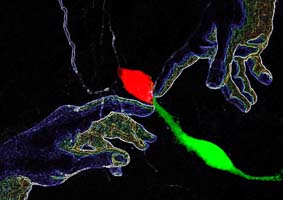
A researchers’ team of the Molecular Neurobiology Unit of the University of Valencia, led by Full University Professor of Cell Biology Isabel Fariñas, has recently published in the journal ‘Nature Cell Biology’ the results of a work that could shed light on the normal programme of activation of stem cells in the adult brain to produce new neurons throughout life.
Our tissues are constantly being renewed thanks to the stem cells that generate new cells to replace old cells. These stem cells are located in very specific locations within tissues, known as microenvironments or niches and in which stem cells are related to other types of cells. Although the regulation of these cellular interactions is poorly understood in general, stem cells in the adult brain are attached to other cells of its niche by a cell adhesion protein called N-cadherin, acting as a link. This study, carried out with mice, has shown that there is a protein, called MT5-MMP, which is able to cut this link totally releasing stem cells from the control of the niche. “The work allows us to better understand the relationship between stem cells and their environment and identifies molecular targets on which to act to enhance the activation of these cells during the renewal of tissues or in regenerative processes”, says Eva Porlan, first author of the work.
“Furthermore, it is important to take into account that the uncontrolled activation of stem cells can give rise to tumours”, explains Fariñas.
With all that, the neurobiology developed in the University of Valencia provides, once again, new data in the study and advancement of regenerative medicine, a field of science which seeks therapeutic solutions based on stem cells for degenerative processes, such as the Alzheimer or Parkinson.
This research has been published in the issue of July of the prestigious scientific journal Nature Cell Biology, where the team of the University has had the collaboration of the teams of Antonella Consiglio of the Institute of Biomedicine of the University of Barcelona (IBUB), of Carlos López-Otín of the University of Oviedo, and of Robert Kypta of the CIC bioGUNE of Bilbao.
The team of Fariñas belongs to the Molecular Neurobiology Unit of the Department of Cellular Biology and Parasitology and to the ERI of Biotechnology and Biomedicine of the University, to the Centre for Networked Biomedical Research in Neurodegenerative Diseases (CIBERNED) and to the RETIC of Cellular Therapy of the Salut Carlos III Institute, and is Prometheus group of excellence of the Valencian government.
Reference article:
Porlan E, Martí-Prado B, Morante-Redolat JM, Consiglio A, Delgado AC, Kypta R, López-Otín C, Kirstein M, Fariñas I.
MT5-MMP regulates adult neural stem cell functional quiescence through the cleavage of N-cadherin.
Nature Cell Biology, 2014.
Last update: 24 de june de 2014 07:00.
News release



















